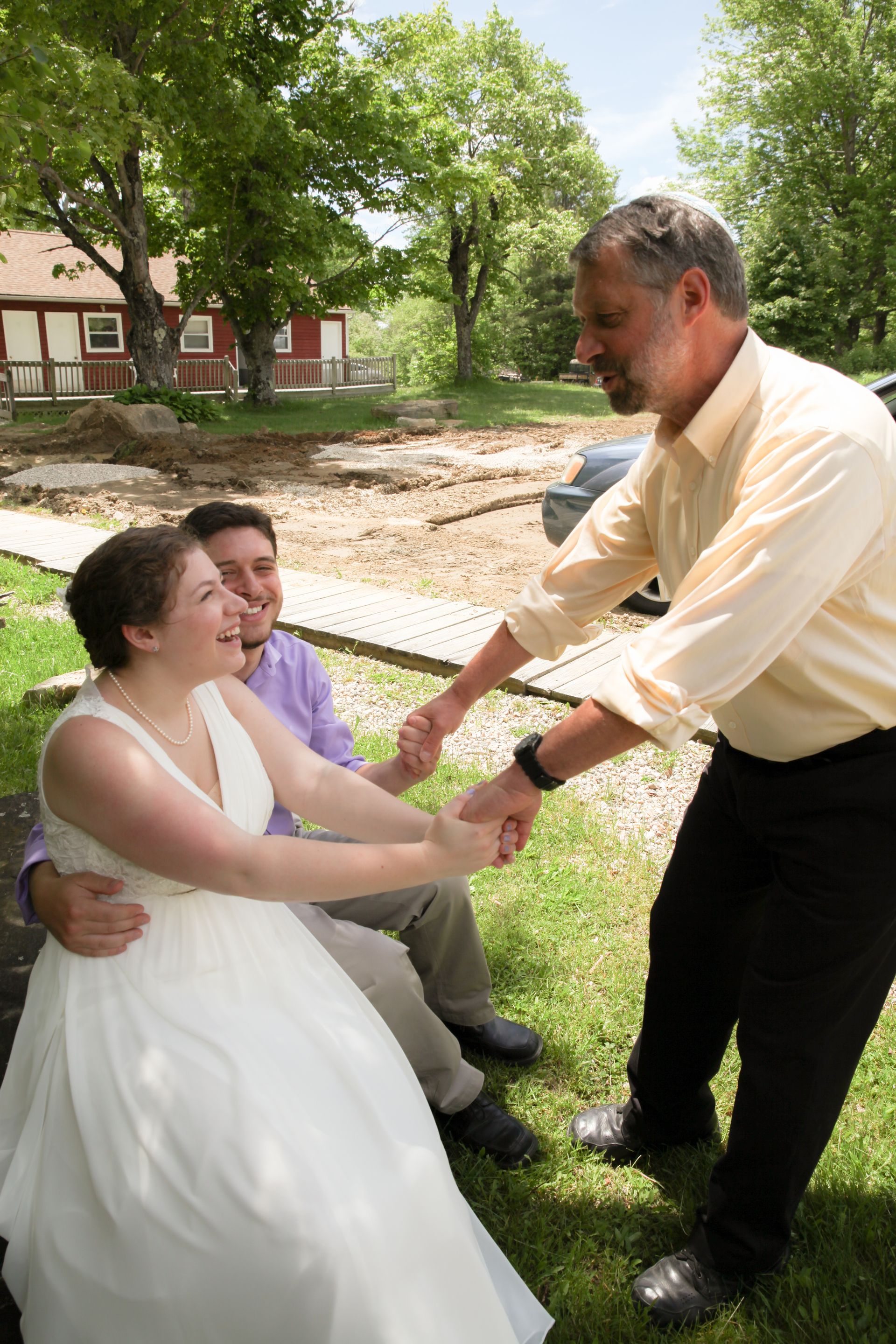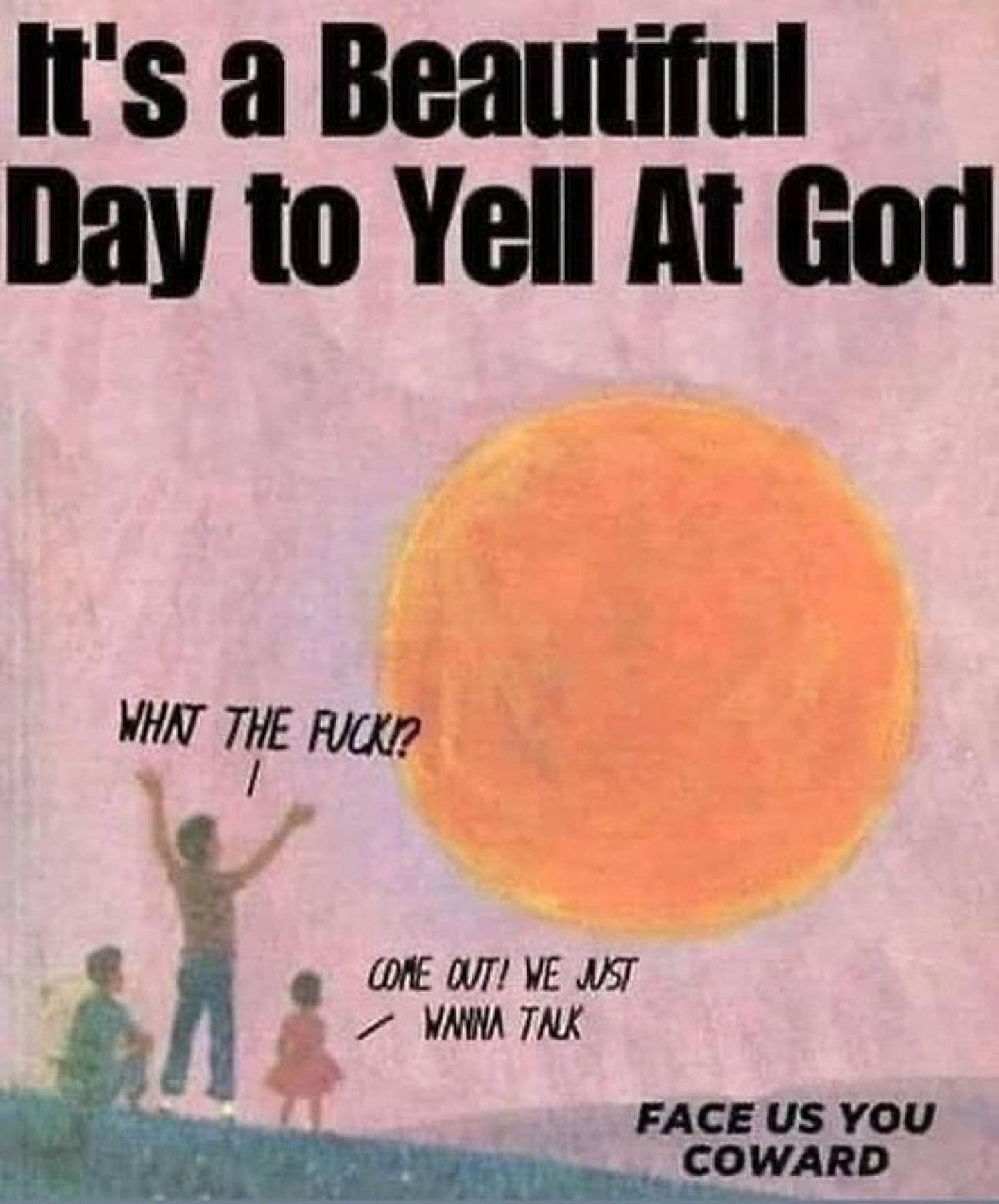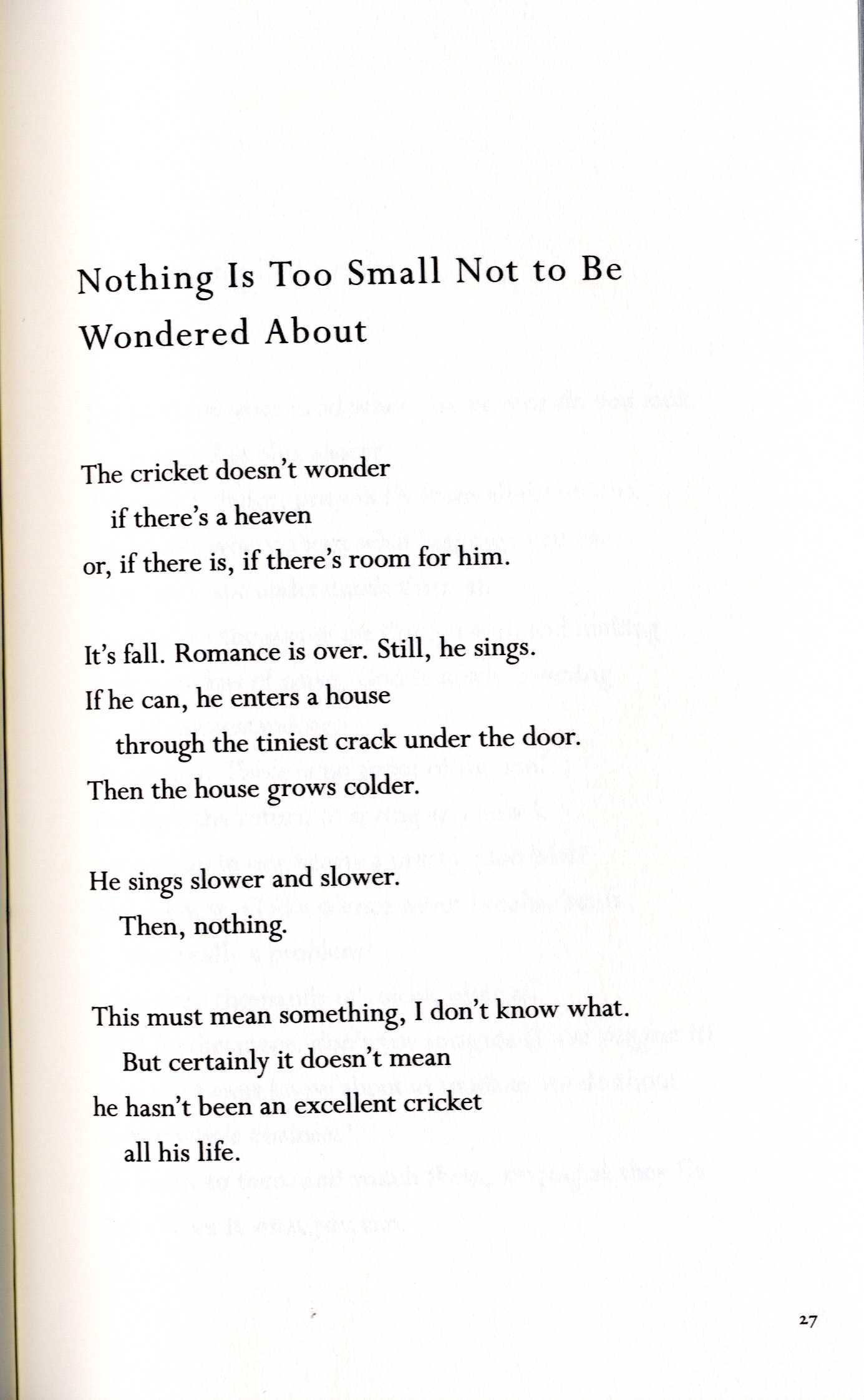- Creativity for Good
- Posts
- 💜(9/26) the creativity for good friday five
💜(9/26) the creativity for good friday five
this week’s highlights on creating for good
This week, I’m writing to you from my in-laws’ home in upstate New York, gathered with family following the death of my father-in-law earlier this week.
David was a wonderful man, a brilliant teacher and thinker, a devoted father and grandfather. He officiated at our wedding, taught all around the country, and had a larger-than-life presence that never fully disappeared, even after he was diagnosed with the motor neuron disease that cost him his mobility, his voice, and ultimately his life. We will miss him so, so much.

rabbi david says “GET UP THE PARTY IS STARTING WITHOUT YOU” (june 8, 2014)
David was a rabbi by education, training, and ordination, but he was first and foremost a teacher, and his favorite thing to teach was curiosity and questioning. Nothing, in his opinion, was sacred, unmoving, or set in stone — everything, from the nature of God to the concept of the soul, could be questioned, approached with an open mind and a curious heart. The dedication of his first book, Judaism, Physics, and God: Searching for Sacred Metaphors in a Post-Einstein World, painted a clear picture of not just his dedication to curiosity, but his hope that more people would learn to cultivate it:
This book is dedicated to all those with the courage to confront new and strange ideas. Such ideas stretch the mind and the soul, and challenge what we thought we knew. Looking them in the eye can be exhilarating — and scary.
“But do it anyway” is unspoken, but it’s there all the same.
To me, curiosity and creativity are inextricably linked. One can’t create without asking questions — fundamentally, every act of creation begins with some kind of what if? When we set out to make something, with our hands or our hearts or our minds, we’re engaging in acts of discovery, in questioning, in shaping something new out of whatever is now.
In moments like this, curiosity is critical. With right-wing dollars and authoritarian politicians actively taking ownership of everything from major news networks to social media platforms and algorithms, curiosity isn’t just a skill to be cultivated, it’s necessary for survival. I’ve personally always been team question the cops, but we’ve reached a point where everything needs to be investigated, interrogated, and combed through for grains of truth. The best time to brush up on your media literacy skills was yesterday, but the second best time is now.
It feels funny to be writing this the week of Rosh Hashanah, the Jewish New Year, when we restart the calendar. At services on Tuesday, my synagogue — like others around the world — read the story of the binding of Isaac, in which God instructs Abraham to take his son up a mountain and sacrifice him as an offering to God. Abraham does so without question. At the last moment, an angel intervenes, telling him, essentially, “Because you were willing to give your son to God without objection, you don’t have to give your son to God after all.”

hey uhhhhhh what the shit, man?
This is a story that encourages the opposite of curiosity. It’s a very right-wing sort of story, honestly — the idea that blind faith and obedience will be rewarded, and questioning punished. I personally don’t fuck with that, and while I never asked his opinion on this particular parable, I don’t think my father-in-law would have, either.
This week, this year, and in all the days to come, my wish for all of us is for more curiosity. More questioning. More creation. In my father-in-law’s memory, yes, but also because it’s essential. When the party tells you to obey, curiosity is a refusal to comply.
It’s resistance. It’s creation.
It’s joy.

Mary Oliver, “Nothing Is Too Small Not to Be Wondered About”
your friday five!
this week’s highlights on creating for good
Feeling powerless doesn’t mean you are powerless (Daniel Hunter for Waging Nonviolence)
This article is a great recap of some of last week’s clusterfuckery of events, but also hits on what I think is a critical point in what’s going on right now:
“Authoritarianism is a system of controlling a population — not by persuasion but by a little bit of raw power and a lot of fear. Fear with a dose of raw power can make people fold. It can cause capitulation as companies, universities, organizations and individuals try to make deals with a bully.”
A lot of people are making those deals (obeying in advance, as one might say) but what Hunter highlights in his article are the many places where people are saying no. Pushing back, refusing to obey, taking whatever actions they can — from protesting ICE to cancelling a Disney vacation — to make it clear that these attempts at control are not absolute. There are ways to refuse to take part in what is happening right now, with our bodies and our voices and our wallets and with all of those combined. Authoritarian works by encouraging a sense of powerlessness.
This, too, is where we lean into curiosity — where we say, “What if I did have some power, after all? What can I use it to do?”After the Eaton Fire, a Los Angeles Community Garden Rebuilds (Jennifer Oldham for Civil Eats)
Earlier this year, I read the Amberlough Dossier by Lara Elena Donnelly, a trilogy about a fictional country that undergoes a fascist takeover and ultimately comes back from the ashes. One of the most surprising things about it for me, as a reader, was that the third book — which one would expect to be the blazing climax in which the fascist government is dismantled — takes place in the wake of revolution, focusing not on the guns and glory but on the messy, complicated, difficult work of rebuilding.
Rebuilding is an act of creation — but more than that, it’s an act of recreation, creating something anew. This article shares a microcosm of what that work can look like: Learning from what came before, finding the flaws and weaknesses and harms, and gently, lovingly, determinedly crafting something beautiful.Saving the Venus Flytrap: How One Woman Rallied a Town Around Its Weirdest Attraction (Lindsey Liles for Garden & Gun)
Along similar lines: What if we could save something, before it was destroyed at all?
This is a long read, but a beautiful one. Activism and organizing are marathons, not sprints; there’s a reason that seasoned organizers tell us to find a focus and stick with it rather than spreading ourselves thin and burning out. For Julie Moore, the flytrap-saving woman in this story, that focus has created a massive ecological ripple effect:“With longleaf as the defining element of structure and fire as the agent of renewal, all of these plants add up to an ecosystem—and a home for red-cockaded woodpeckers, Bachman’s sparrows, salamanders, tortoises, and all sorts of insects, which, despite the peril that lurks on the forest floor, have thrived here for millions of years. ‘When you save flytrap habitat, you save all of it,’ Moore says, gesturing around her. ‘You save all of this.’”
(emphasis added)
Consider: What do you find so important, so crucial to the ecosystem of your life, that you would dedicate years of daily effort and action to preserve and protect it? Find that one thing. Make it an altar. Act, and act, and act.Abolition is About Making Things… (Mariame Kaba for Prisons, Prose & Protest)
Kaba is one of my most frequently-cited teachers, and for a good reason: She combines the stubborn hope of imagination and belief in the possibility of a liberated future with the clear-eyed focus of an experienced organizer. Her ability to connect concept to action, with the understanding that she herself might not be there to see those actions bear fruit, inspire me daily. But what stood out to me in this particular reflection, centered on a recent all-ages abolitionist community event she helped organize, was this:
“The future and imagination are important to me because the horizon that I am working towards is one I have never seen: that horizon is a world without policing, imprisonment, or surveillance. As my comrade, writer, artist and scholar Eve Ewing says, ‘In order to create pathways toward that which we have never seen, we have to lead with imagination.’
[…]
In this collective abolitionist project, we don’t know if we’re going to win. But in the words of Jayesh Bhai, who I learned about through my comrade Sonya Shah, we’re trying to ‘act with the urgency of tomorrow and also with the patience of 1,000 years.’ This project is a long-term one.”
(emphasis added)
Imagination is as key to creation and creativity as curiosity — we can’t create without both. The creation of a future is as magical as the creation of a story, a piece of music, a work of art.Writing Yourself Into Existence: On Loving Worlds Where We Don’t Belong (Abdi Nazemian for Literary Hub)
So much of the work of imagination, curiosity, questioning, creation is about empathy. When we create, we go inside ourselves, drawing from our own lives and loves and experiences, but we look beyond the borders of our bodies and souls as well. The world around us shapes who we are and how we think and what we value, and sometimes — often times — that world is cruel.
But just as we imagine and (re)create worlds of community gardens and thriving flytraps and liberated communities free of mass surveillance and policing and incarceration, we also imagine spaces for ourselves — spaces full of love and light and connection — amidst systems that wish us harm. Reflecting on a lifetime of consuming and adoring media that intentionally excluded people like him, Nazemian writes:
“In writing this novel, I started to understand that perhaps my passion for art that excluded me was once about escape, but now it’s simply about love. I still love Archie Comics and Old Hollywood films despite their flaws, just as I love humans despite our flaws (or perhaps because of them, because what makes us more lovable than our imperfections?). In Exquisite Things, I write, ‘Love is the only thing worth living for. Not just romantic love. All of it. The love of family. Of community. The love we feel for a poem or a song or a moment in time.’
My purpose as a storyteller is first and foremost to give young people the chance to be seen and represented in the art that is available to them.”
(emphasis added)
If I could teach one thing for the rest of my life, it would be that creativity is an act of love — love for everything that Nazemian highlights here, and everything he didn’t have space to include. We keep creating because we believe, because we hope, because we love.
Let’s keep going.
See you next week!
💜Shelly